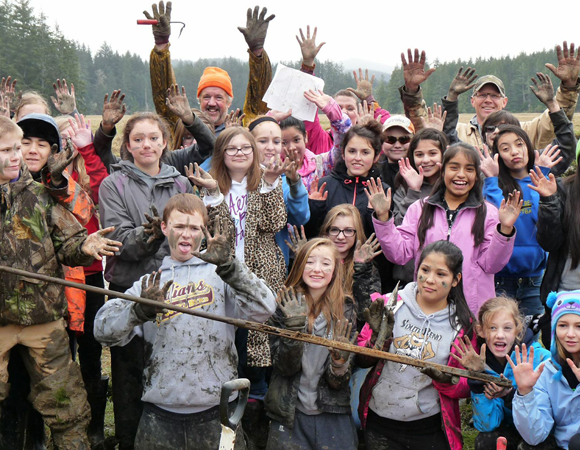
South Bend, Washington 7th and 8th graders visited Niawiakum River on a tsunami geology field trip after their teachers participated in the CEETEP Astoria workshop. 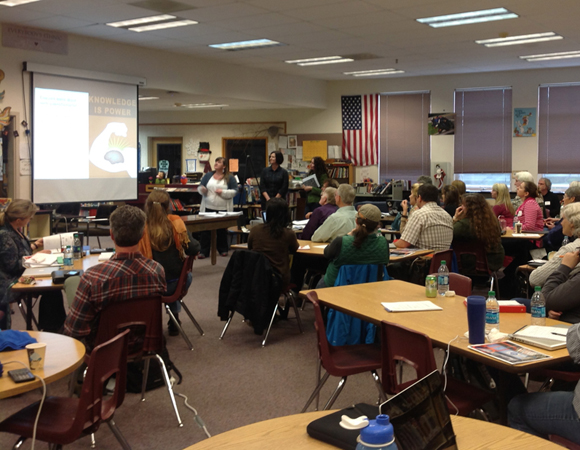
Participants from both 2013 CEETEP workshops reconvened in Newport, Oregon on March 8, 2014 for a Share-a-thon. 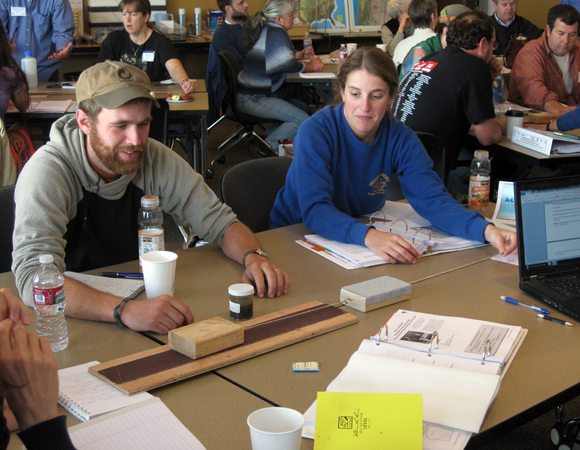
CEETEP participants practice using the “Earthquake Machine” that helps learners understand the irregular pattern of elastic energy release and challenges in precise earthquake predictions. 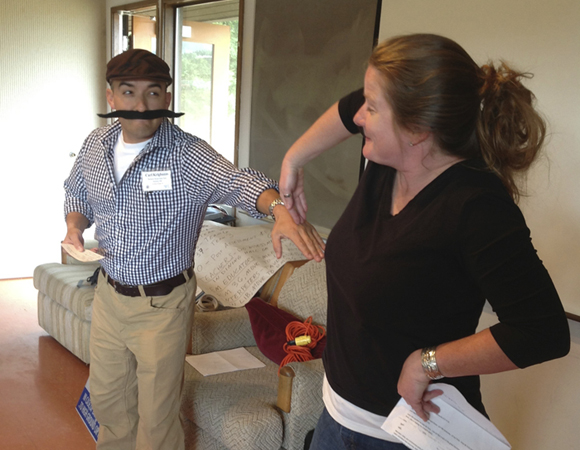
Juan de Fuca and Subduction Sally are the key characters in an interpretive skit about Pacific Northwest tectonics during the Newport Oregon Workshop final presentations. 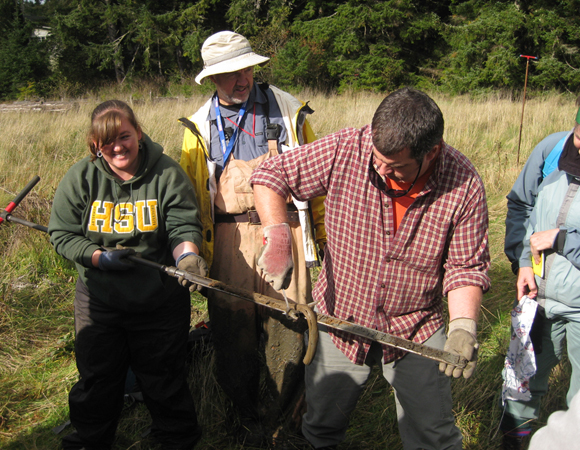
CEETEP participants work with USGS scientist Brian Atwater (in back) to core sediments at the Niawiakum River mouth in Washington. 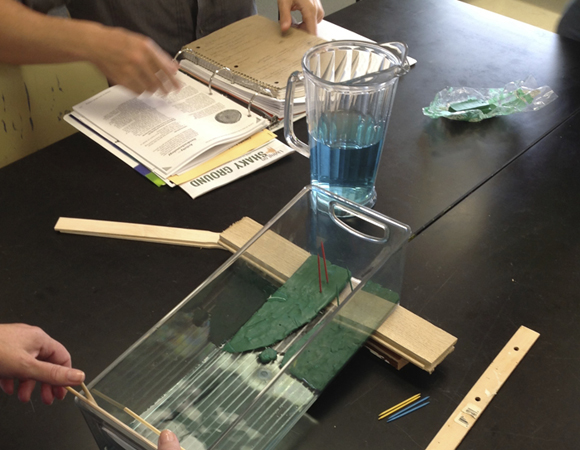
A tsunami wave tank allows students and informal learners to investigate the properties that affect tsunami inundation. 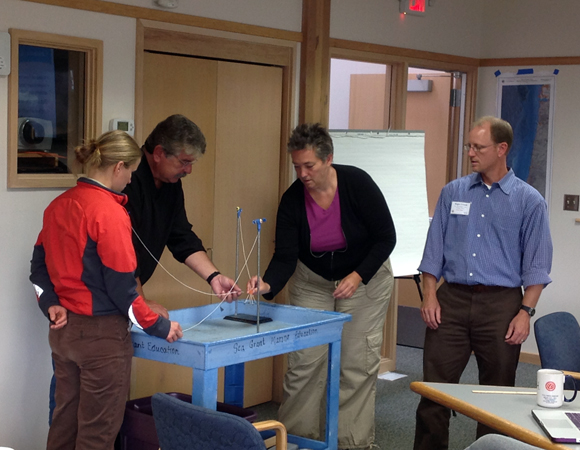
CEETEP participants and former UNAVCO Teacher in Residence Roger Groom (far right) learning the Introduction to GPS activity that can help students and the general public learn how GPS works. 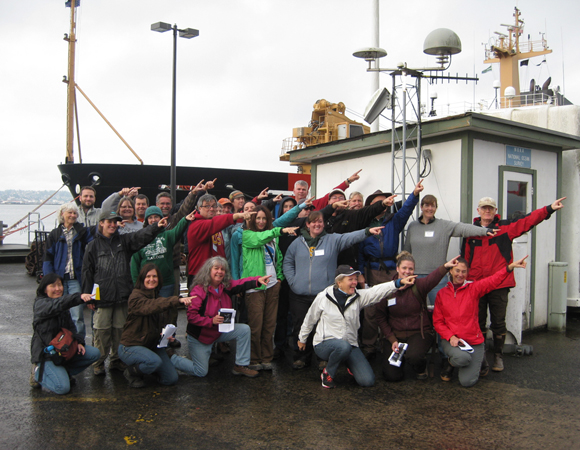
CEETEP participants from the October 2013 workshop at GPS station TPW2 (Astoria, Oregon) showing the direction of plate motion relative to stable North America (northeast) 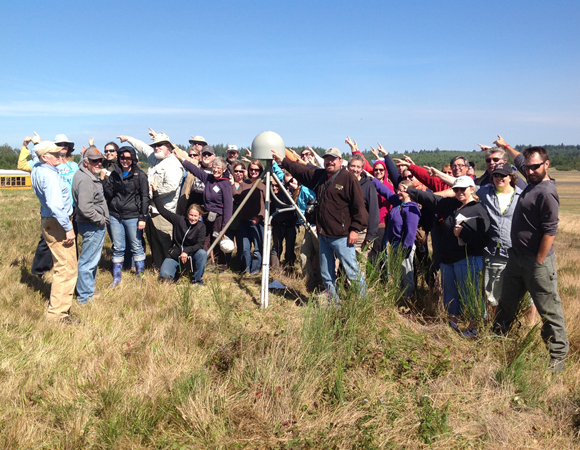
CEETEP participants from the August 2013 workshop at GPS station P367 (Newport Oregon Airport) showing the direction of plate motion relative to stable North America (northeast).
Project Overview
Through a grant from the EarthScope Program of the National Science Foundation, the Cascadia EarthScope Earthquake and Tsunami Education Program (CEETEP) offers four-day workshops to foster community engagement in earthquake and tsunami science and preparedness and to encourage collaboration and exchange between formal and informal educators. The project is collaborative between Oregon State University, University of Portland, and Central Washington University with UNAVCO providing technical and curricular resources support.
Forty-six educators participated in the first year of CEETEP. The professional development program brings together teachers, park/museum interpreters, and emergency management educators to learn about EarthScope science, Pacific Northwest geology and hazards, and preparedness. The project held the first two workshops in August and October 2013 for educators in coastal southern Washington and northern Oregon. A follow-up Share-a-thon was run March 8, 2014 for participants from both workshops to present on accomplishments and activities.
Significance
The same geological forces that form the spectacular beaches and headlands of the Pacific Northwest also threaten lives and infrastructure with earthquakes and tsunamis. CEETEP is working to mitigate the effects of these potential disasters through collaboration building and professional development for educators in communities along the Oregon and Washington coast. Joint professional development between different types of educators is atypical and a component of the project is researching the challenges and benefits of the model.
Results from Year 1 of the project are very promising. Participant geoscience content knowledge on workshop topics improved from an average of 50% to 87%. Teaching confidence also improved dramatically from 2.8 to 5.4 on a 6-point scale with 6 indicating the most confidence. Participants are also much more “optimistic” (from 5.7 to 7.3 on a 9-point scale) about the value of community-level planning to mitigate future disasters. Eighty-six percent of participants agreed or strongly agreed that the model of joint professional development for educators was effective. CEETEP participants have reached more than 5400 learners through 140 presentations since August 2013 and anticipate more than doubling this by August 2014.
CEETEP has two more years of funding and will run workshops in Aberdeen, Washington and Olympic Peninsula, Washington in 2014 and move to southern Oregon and maybe even northern California in 2015.
Highlights
Several CEETEP participants achieved particularly notable outcomes.
- Sean Bedell’s class at the Eddyville Charter School conducted a tsunami geology coring investigation and hazards assessment project that received the Samsung Solve Prize for Oregon – $20,000 in Samsung equipment for the school. Watch the Eddyville Tsunami Project class video.
- Alyssa Caudill and Key McMurry received nearly $1000 from the Earthquake County Alliance for the South Bend leadership class’s preparedness activities; took entire South Bend 7th and 8th grade classes on tsunami geology field trips; and arranged to have 16 SCEC Quake Catcher Instruments in schools, libraries, and other educational facilities in Pacific County, Washington.
- The team from Astoria, Oregon worked collectively to have the Columbia River Maritime Museum’s December 2013 Community Day focused largely on earthquake and tsunami science and preparedness. This reached hundreds of community members and involved more than a dozen Astoria High School students as docents.
Animations
Collaboration between CEETEP and UNAVCO resulted in the development of two new animations that feature how GPS is critical to understanding and mitigating earthquake hazards on a variety of different timescales.
- What can GPS tell us about future earthquakes?
- GPS as an essential component of Cascadia Earthquake Early Warning
Project Information
- Pricipal Invesitagor(s): Robert Lillie, Nancee Hunter (OSU), Robert Butler (Univ of Portland), Beth Pratt-Sitaula (CWU)
- UNAVCO Staff: Ken Austin, Shelley Olds and Beth Pratt-Sitaula
- Dates: August 12-15 & Oct 11-14, 2013; March 8, 2014
- Locations: Newport, Oregon and Astoria, Oregon
- Funding Source: NSF EarthScope
Related Links
- CEETEP website
- Animation: What can GPS tell us about future earthquakes?
- Animation: GPS as an essential component of Cascadia Earthquake Early Warning
- Students discover reach of tsunami, win state award
- Video: Eddyville Tsunami Project
- Quake-Catcher Network Installed in Pacific County Schools
- Columbia River Maritime Museum’s 2013 Community Day
Written by:
- Beth Pratt-Sitaula
- Posted: 12 April 2014
- Last updated: 29 June 2021
- Tags: community, project highlights


